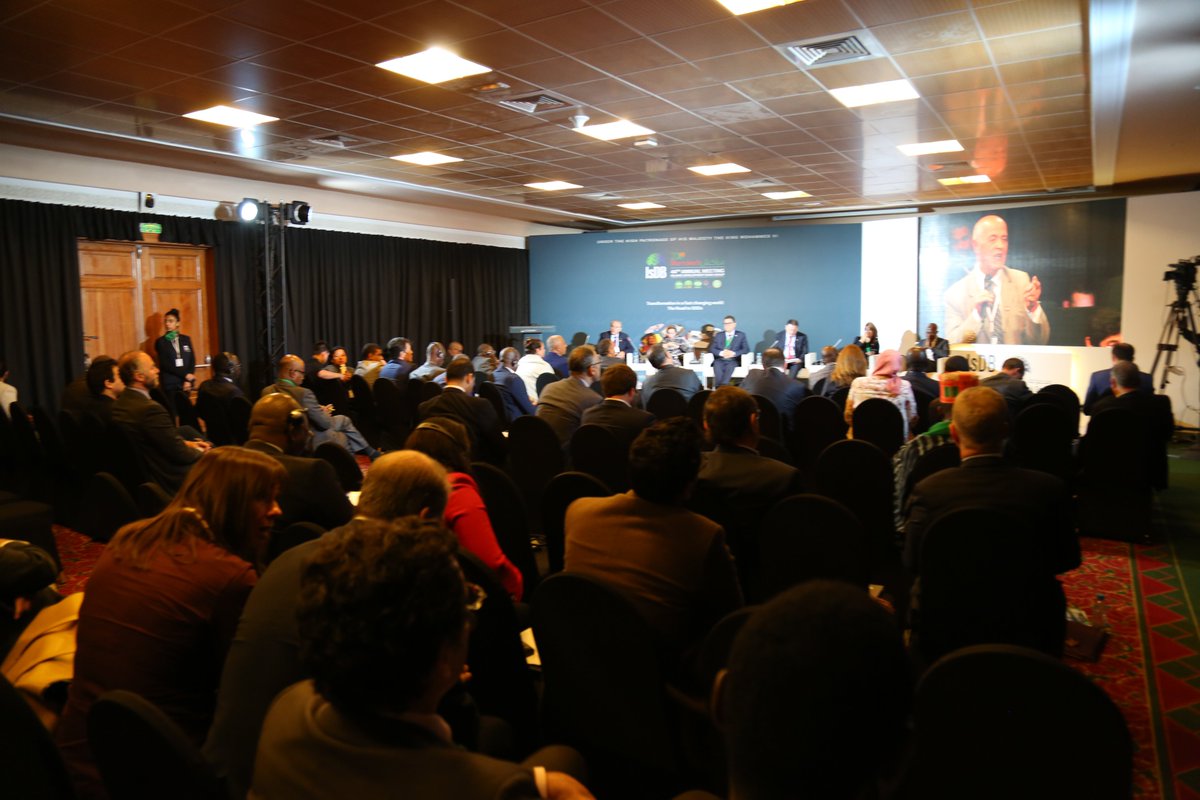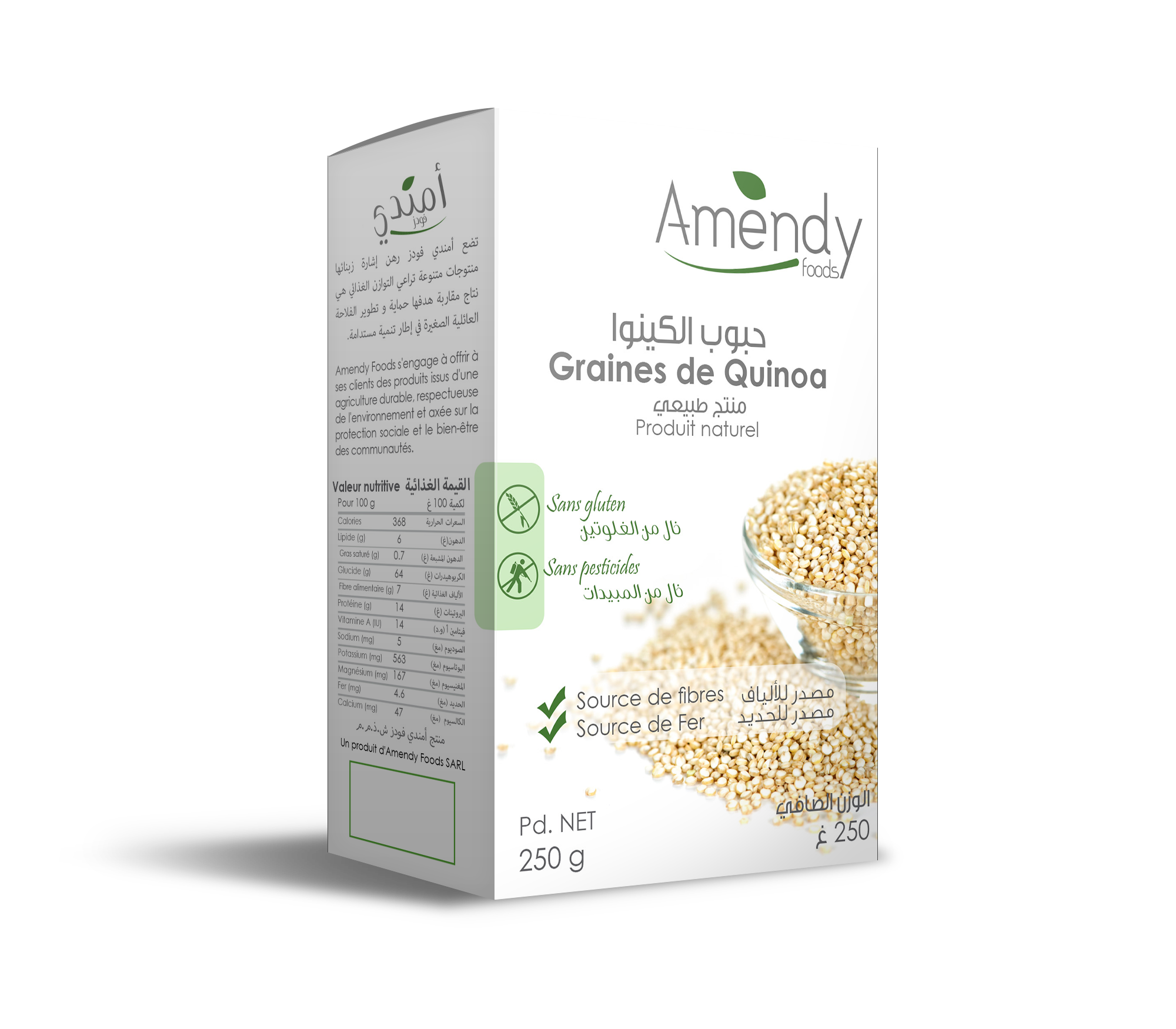6 April 2019. Marrakesh, Morocco. Value chains for super crops key to fighting poverty, hunger in IsDB member countries
@ICBAAgriculture
 Creating value chains for resilient, underutilized crops like quinoa, sorghum and Salicornia should form the cornerstone of food security and poverty reduction strategies in the face of climate change and other threats to agricultural production and rural livelihoods in member countries of the Islamic Development Bank (IsDB).
Creating value chains for resilient, underutilized crops like quinoa, sorghum and Salicornia should form the cornerstone of food security and poverty reduction strategies in the face of climate change and other threats to agricultural production and rural livelihoods in member countries of the Islamic Development Bank (IsDB).
This was the consensus of leaders, policymakers, scientists and experts attending a high-level event on sustainable agricultural value chains on the sidelines of IsDB’s 44th Annual Meeting held from 3 to 6 April. More than 100 delegates from around 30 countries looked at how climate-smart crops can help to achieve Sustainable Development Goals (SDGs) 1 and 2 on no poverty and zero hunger.
@ICBAAgriculture
 Creating value chains for resilient, underutilized crops like quinoa, sorghum and Salicornia should form the cornerstone of food security and poverty reduction strategies in the face of climate change and other threats to agricultural production and rural livelihoods in member countries of the Islamic Development Bank (IsDB).
Creating value chains for resilient, underutilized crops like quinoa, sorghum and Salicornia should form the cornerstone of food security and poverty reduction strategies in the face of climate change and other threats to agricultural production and rural livelihoods in member countries of the Islamic Development Bank (IsDB).This was the consensus of leaders, policymakers, scientists and experts attending a high-level event on sustainable agricultural value chains on the sidelines of IsDB’s 44th Annual Meeting held from 3 to 6 April. More than 100 delegates from around 30 countries looked at how climate-smart crops can help to achieve Sustainable Development Goals (SDGs) 1 and 2 on no poverty and zero hunger.
“The IsDB’s recognition that effective engagement of the private sector through commodity value chains that have national, regional and global markets is critical to commercializing the sector. This will enhance the sustainable delivery of production inputs (improved seeds, fertilizers, mechanization, among others) and link farmers better to output markets. This is the way out for growing smallholder agriculture that dominates the rural economies of our countries.” Dr. Mansur Muhtar, Vice President, Sector Operations, IsDB
Organized by the IsDB, the International Center for Biosaline Agriculture (ICBA) and the OCP Phousboucraa Foundation, the side event discussed at length the potential of super crops for food production and income generation in marginal environments, characterized by high levels of soil and water salinity, water scarcity and drought, among other things. The panelists included:
- Mr. Mohamad Jamal Alsaati, Director, Office of the IsDB President and ICBA Board Member;
- H.E. Gilbert F. Houngbo, President, the International Fund for Agricultural Development (IFAD);
“At IFAD, we believe that any process of rural transformation has to be undertaken in partnership with indigenous and local populations to ensure rural transformation is inclusive and based on consent. We look forward to furthering our partnership with the Islamic Development Bank in this area, specifically through IFAD's Indigenous People Assistance facility, which is governed by a board composed of indigenous peoples’ leaders and channels funds directly to projects that are designed and managed by indigenous communities themselves.” - Dr. Ismahane Elouafi, Director General, ICBA;
“Over the years, ICBA has been working towards achieving sustainable livelihoods and food security in marginal environments. Our center has been working in partnership to provide smallholder farmers in such environments with holistic solutions that can improve agricultural productivity while conserving and improving the natural resource base.” - Mr. Aly Abousabaa, Director General, the International Center for Agricultural Research in the Dry Areas (ICARDA);
- Ms. Hajbouha Zoubeir, President of OCP Phousboucraa Foundation. “As for value chain addition, Phosboucraa Foundation has supported special projects on production of a new brand of couscous based on quinoa thanks to our partnership with ICBA and the Ministry of Agriculture, Fisheries, Rural Development, Water and Forests of Morocco, vocational training on camel meat transformation, and transformation of vegetable by-products to produce a new type of silage, allowing healthy and good quality milk and meat.”
Sucess story: The Rehamna quinoa project, Morocco
November, 2017 - November, 2020
Funded by the International Development Research Centre (IDRC)
The Rehamna quinoa project, aims to improve food security and incomes of smallholder farmers in marginal areas of Morocco through the production, consumption and sale of high-value and stress-tolerant quinoa.
Funded by the International Development Research Centre (IDRC)
The Rehamna quinoa project, aims to improve food security and incomes of smallholder farmers in marginal areas of Morocco through the production, consumption and sale of high-value and stress-tolerant quinoa.
- Funded by Canada’s International Development Research Centre (IDRC/CRDI), the project is implemented by ICBA in collaboration with Mohammed VI Polytechnic University and the Ministry of Agriculture, Fisheries, Rural Development, Water and Forests of Morocco.
- Under the project, several associations have started producing value-added quinoa-based products such as couscous.
- One of the associations is the 3ème millénaire (3rd millennium) cooperative, which is managed by over 30 rural women. The association produces several products from quinoa and other crops, and provides incomes to rural women and young girls.
- The project is also working with farmers’ associations such as Chabab M'khalif who have benefited from the introduction of best cropping practices and mechanized tools.
- The project is also trying to support start-up agri-businesses such as Amendy Food to promote quinoa at the national level.
- The project has established a seed production system and developed processing tools in collaboration with Ben Rim Farm to produce and commercialize ICBA quinoa varieties.

Related Sucess story:
The MENA region is home to an estimated 380 million people and is rapidly becoming one of the most urbanized areas of the world, adding pressure on an already fraught agricultural system. Approximately one third of land in the region is forecast to face constraints to crop production as a result of climate change. As a result, rural livelihoods are threatened, which could drive even higher migration rates to urban centers.
A multi-partner project on ‘Enhancing Food Security in Arab Countries’, funded by AFESD, the Kuwait Fund for Arab Economic Development (KFAED), the Islamic Development Bank (IsDB) and OFID, further helped in disseminating this technology to farmers in Al-Sharkia province. The use of raised-bed techniques in farmers’ fields resulted in 25% saving in irrigation water, 30% increase in wheat yield and 74% improvement in water use efficiency (average of four years 2011-2014).






No comments:
Post a Comment